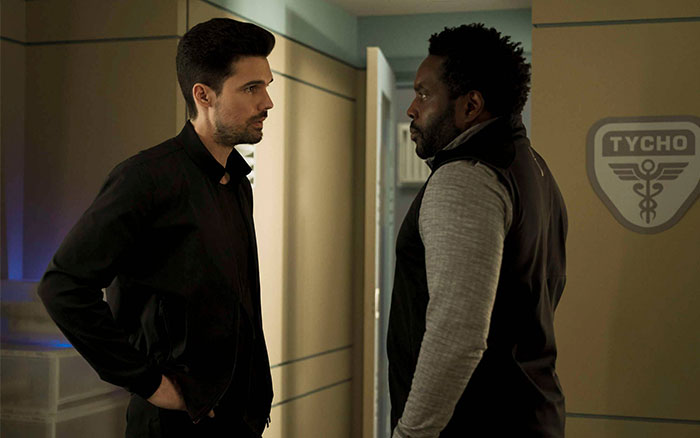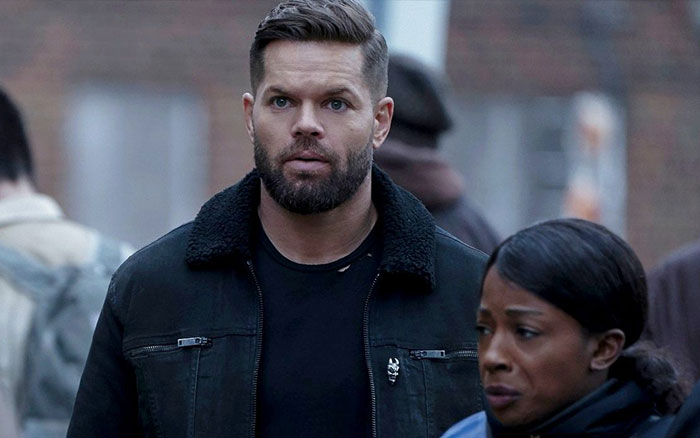Compared to the previous season, the action of which took place mainly on one of the newly discovered and non-colonized planets, here we are dealing with a breakdown of the plot into several main threads. This allows us to enjoy the breadth of all the worlds presented in The Expanse throughout the season .

Thanks to this, we watch the Earth plunged in an eternal crisis, the emptying of Mars or what I am most interested in in this series, i.e. travel and life on spacecraft. All these worlds are extremely realistically presented, and each of them differs from the previous one in terms of technological advancement, size and such ordinary, visible to the naked eye, wear and tear. The modern and slender Bobbie Draper is a completely different view than the heavy, angular ship led by Camina Drummer. Life in cramped and windowless quarters on Mars looks different than in Baltimore (visual associations with the HBO series Law of the Street are justified).
The crew of the Martian corvette Rocinante had been working together so far, and it was thanks to this cooperation that they survived safely and fully up to this point. Now it has split apart and each of them has their own thread. It is not by some fate, but it is a conscious decision of each of them.

Amos returns to Earth, where he confronts his dark past, Naomi goes in search of his son, and Alex travels to Mars to reconnect with his family and meet with Bobbie who lives there, who follows arms smugglers. Avarasala faces an election defeat in a subordinate position on the moon. And only Holden remains where it always has – at the center of the dangerous protomolecule battle at Tycho Station. Somewhere in space, you also meet the tough captain Camina Drummer and her pirate crew. All of them, regardless of their plans and actions, are however drawn into the game of the Belt extremist and a significant person from Naomi’s past, Marco Inaros, with Mars and Earth.

The fact that it takes a few relatively slow episodes before Inaros’ terrifying plan takes place makes The Expanse season five compares much better than its predecessor. We observe how the threads of the heroes known to us develop slowly, we experience bitter returns and shocking discoveries, all the time thinking with anxiety about the impending attack of Inaros on Earth – as about that bomb hidden under the table, about which Alfred Hitchcock once talked about. When this bomb explodes and a catastrophe takes place on Earth, the action moves forward and there is no question of debts or over-the-top scenes.
We spend more time with the characters, and we can learn what made Naomi’s son become a separatist, how she was treated by other Passengers, and what life Amos had before leaving Earth. It turns out that both Naomi Nagata and Amos Burton have their secrets and we – viewers – can just get to know them after years of becoming attached to these heroes.

Burton’s plot is the most interesting of the season, because apart from learning about his past and how ordinary people live on Earth, we see Amos working without his crew, who turns out to be his anchor and moral compass at the same time. What’s more – and this makes Amos Burton my favorite character in the entire series – he is well aware of this and wants to join them as soon as possible so as not to return to the path abandoned years ago.
In general, casting in this series is a hit in almost every case – from the aforementioned Amos (Wes Chatham) to Captain Drummer (Cara Gee) and Marco Inaros (Keon Alexander), who is certainly someone’s problematic object of sighs. I am very sorry that Thomas Jane and David Strathairn had to say goodbye to The Expanse , because their acting was a pleasure to watch.

I have the impression that in the previous season, The Expanse was just gathering wind in its sails after Amazon saved the production, and now show us what the creators, the film crew and the cast really can do. It is in The Expanse momentum space opera , but there are also slower and more reflective moments that do not seem to be dragged or unnecessary, and in addition adequately build the tension before the next explosion. Heroes can be tough and ruthless at one point, as formed by life on Earth or the Belt, and then show their more subdued, sensitive side. And sometimes it’s the other way around, and even those brainwashed over many years show their more human side.
The Expanse has great source material that I highly recommend to everyone. And it so happens that there is a time shift of almost three decades between volumes six and seven. This very moment was chosen by the creators of the series as a good one at the end of their story. And while on the one hand I will miss the Rocinante crew and the tough men and women they dealt with along the way, I think it’s a great decision. If the second half of season five is as satisfying as the first five episodes, and season six closes all threads and allows the history of the Passionate Revolution to organically end, The Expanse will surely retain its title of the best science fiction series in history.

